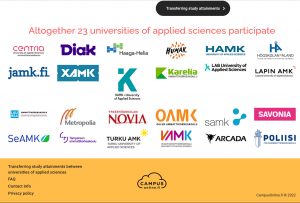
Remote or online learning as a new normal?
Vol. 25, Issue 02, 16 September 2022
In recent news – even in Finland Xamk and LUT students have been mentioned – it has been stated that students now prefer to continue studying remotely, having been forced to do so during the recent couple of years of the pandemic. Not only those that have become used to studying from home, but also the trend is for new students to request more remote or online studies.
First let me try to clarify what is meant by “online” studies, as I have seen students, lecturers and institutions having different ideas of this. Online studies can be seen by many as having full, interactive lectures via a live video link – often done through MS Teams or Zoom today. Another way to interpret online studies is that the lecturer provides material through an online portal, such as Moodle or Learn at Xamk, and students work their way through the material (slides, texts, links, discussions, tasks, etc.) according to instructions from the lecturer. This might also be combined with some traditional classroom sessions. Then, something that is reminiscent of the OU of old, MOCs (massive online courses). These types of fully automated courses allow students to study at their own pace, wherever and whenever they like, usually without any deadlines, and there is no interaction with a lecturer or other students.
At Xamk, online study offerings have increased. This can be seen due to courses being offered to all campuses necessitating the need for non-contact sessions, increased student numbers, and more flexibility. We even have some degrees that are offered completely online. Also, the popularity of Campus Online (campusonline.fi) has grown as students see the possibilities of fast-tracking their studies by taking courses to substitute in their normal curriculum.

Added to this there is interest in Europe for students taking open degrees through various universities (the INGENIUM alliance), and Xamk is a part of this – see https://www.xamk.fi/en/bulletins/xamk-participates-in-developing-a-new-european-university/ and https://ingenium-eu.education/ for more information. This is not a new thing, open university degrees (distance learning) have been in existence for more than 50 years in the UK, long before we started seeing the rise of the Internet. Their popularity is largely due to the fact that anyone, anywhere, can study for an OU degree – in the OU students can even build their own open qualification based on their own needs. Often students received a package of material when they signed up, and were given instructions how to proceed. In the UK, the Open University had their own televised broadcasts of lectures that students were supposed to follow – the “Internet” of its time.

However – you knew a “but” was coming, didn’t you? – is remote or online education necessarily a good thing? On the one hand I have to say it is, especially for students that are unable to attend full-time studies due to working life, family, or personal situation. Being able to study whenever and wherever you are able to, gives great freedom – but students need to be self-motivated and have the ability to carry out their learning independently. Also, course offerings need to be delivered in such a way that they encourage engagement and participation from students – the social aspects of studying are often forgotten when delivering education online.
On the other hand, I would say that remote studying encourages students to become more reclusive and less competent in social situations. Being left to work mainly independently especially with the modern distractions of the internet, video streaming, and social media, can result in students losing motivation and increased procrastination in relation to completing their tasks. Students lose out on the normal interaction between students and the fun of studying with others in their group, working closely together on projects, the bonds formed during studies often turn into lifelong friendships and even partnerships. Our society needs people who can interact with others, we need to make friends and increase our social and working networks – studying in a group of like-minded people helps facilitate this.
Having taught for over 20 years, and in addition to having experience of also teaching many courses online for much of that time, I have seen the challenges faced by online students. One would assume that studying online could be so much easier in today’s technology enabled world. However, if anything, over the years I have seen students struggling more and more with their online courses, as the offering of education and the method of delivery, is not keeping up with the needs of students and their changing attitudes to studying. Maybe the new EU open degrees will address these issues?
So, if your life situation dictates it, and you are highly motivated, perhaps remote studying could work for you. However, I would still emphasise the necessity of contact education not only for student wellbeing and feeling a part of something greater, but also to bring life to those towns and cities where campuses are located. In addition to this, in countries where labour is becoming in short supply – such as in Finland – we need to encourage international students to consider taking degrees outside of the Internet and look at the possibilities of studying abroad, in person.

In a recent article, I proposed that we might be moving to a hybrid working life, and for some this is now a reality. Should we then think of some kind of move to hybrid studying including both contact and online studies? If we do, then a workable framework needs to be established that will work for both students, educators, and our societies.
- IBSEN meeting November 2025 – Split, Croatia - 12th December 2025
- Wondering where to get lunch in Kouvola town? - 5th December 2025
- IBSEN Realgame – an international ERP/SCM experience for students - 28th November 2025
